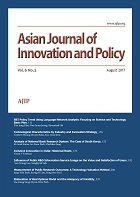 ISSN : 2287-1608
ISSN : 2287-1608
Smart Farming’s Contribution to Sustainable Agriculture: Analyzing Linkages between South Korean Smart Farming Policy and Korean Sustainable Development Goals (K-SDGs)
Abstract
Smart farming (SF) receives significant attention not only as a maximizer of agricultural productivity, but also as a strategy to achieve United Nation’s Sustainable Development Goals (SDGs), yet the actual state of its contribution to the environmental SDGs remains uncertain. This paper presents a methodological approach for policy analysis by identifying linkages between South Korean SF policies and Korean Sustainable Goals (K-SDGs) targets addressing six main South Korean agriculture-related environmental issues. Linkage is defined as an explicit measure that acts as a solution to prevent or minimize a specific issue. First, an overview of K-SDGs and six environmental issues (yield productivity, greenhouse gas emission, pest and weeds, water resources, soil quality and biodiversity) reveals that 17 K-SDGs targets address the issues. The analysis reveals significant shortcomings, particularly in the low integration of pesticide use and soil quality concerns into the K-SDGs. Out of a possible 68 linkages between four SF policies and 17 K-SDGs, only 17 were identified, with 10 linking to food production and consumption-related SDGs. This indicates that current smart farming policies put a secondary focus on smart farm technology’s potential to minimize environmental challenges. To bridge the gap between SF and sustainable agriculture, SF policies should incorporate climate-smart agriculture, with a specific focus on reducing greenhouse gas emissions, and promote greater collaboration among policymaking institutions.
- keywords
- Smart Farming, K-SDGs, South Korea, Sustainable Agriculture, Linkages, Policy Analysis

